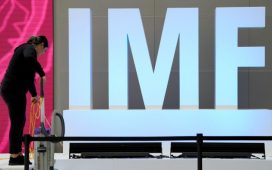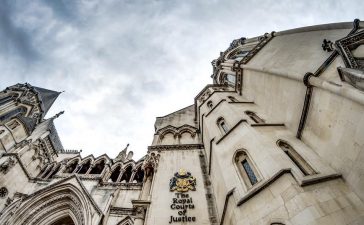The Chancellor used her first appearance at the International Monetary Fund to win global buy-in for next week’s Budget.
Rachel Reeves studiously ducked questions about plans to hammer private sector pensions by imposing national insurance on company contributions.
She simply declared she was determined to free up pension money to invest in infrastructure and start-ups.
It is unclear how if, like her Labour predecessor Gordon Brown, she loads tax on retirement savings.
The main purpose of the visit so far is to buy herself IMF cover for sweeping changes in fiscal rules.

Visit: The Chancellor used her first appearance at the International Monetary Fund to win global buy-in for next week’s Budget
Her decision to enforce a ‘stability’ rule, where current spending has to be paid for out of tax receipts, means big tax rises are on the cards and likely to be frontloaded.
The radical departure is the change to the debt rule. Reeves wants to give herself £50billion-plus of extra room for investment by moving the goalposts.
A range of public liabilities, including funding for the Bank of England losses on bond buying, student loans and investment by the National Wealth Fund, will be excluded from debt calculations.
A new measure – Public Sector Net Financial Liabilities – Reeves believes has the support of the IMF, which is advising more public investment.
The Office for Budget Responsibility, which has seen the proposals, must have signed it off.
As with any major change in the public finances, as Liz Truss learnt to her cost, the acid test will come from the gilt markets, which are wobbling ahead of the budget.
The Chancellor is vowing strong ‘guardrails’ will be put in place to make sure all public investment projects are value for money.
Given the experience with HS2, the Elizabeth Line and much else, that is a huge ask.
There is also the risk that with money piling into Government projects, funding for innovative private sector schemes could be crowded out. Worrying.
Rate Cheer
Andrew Bailey’s appearances before the top bankers’ club – the Institute of International Finance – have become part of mythology in Washington.
Two years ago it was in this setting that Bailey revealed he had been involved in an ‘all-nighter’ putting together a rescue for Britain’s pensions systems in peril as a result of using liability-driven investments.
His manner, a deadline set for resolving matters and the scale of the crisis, caused by Truss’s tax-cutting budget, sent the pound down and gilt yields soaring while he was still talking.

Chief: Andrew Bailey’s appearances before the top bankers’ club – the Institute of International Finance – have become part of mythology in Washington
This year’s appearance was a drier affair. A now slimmed down governor was confident that the inflation dragon had been peaceably slain, much more speedily than expected, and the path towards lower interest rates was much clearer.
The question for markets is how much faith should be placed in the Governor of the Bank of England’s musing. In spring Bailey made the case that inflation in the US and Europe (Britain included) was different.
In the US a belting economy meant higher prices were sticky. In Britain and the EU the cost of living shock was driven by supply side events notably Russia’s war on Ukraine. As energy prices had subsided, borrowing costs were free to fall.
Despite the optimism, the Bank of England’s rate has been cut only once, from 5.25 per cent to 5 per cent.
The European Central Bank in contrast has cut rates by a quarter of a percentage point three times, and the Federal Reserve by a bold half point. Bank rate setters have been behind the curve.
The biggest threat is geo-political uncertainty and a possible energy price shock. But despite volatility, oil prices are stable. Excuses for not doing the right thing and giving home owners, consumers and businesses a break are falling away.
Brass plate
Usually when England plays Liechtenstein at football the debate is how many goals the pampered big league stars will put past the plasterers and lawyers of the tiny state with a population of just 27,000.
Not too small, however, to join the economic first division with prime minister Daniel Risch signing up to be the IMF’s 191st member. Maybe the truth of the late tycoon Robert Maxwell’s hidden millions will finally out.
DIY INVESTING PLATFORMS

AJ Bell

AJ Bell
Easy investing and ready-made portfolios

Hargreaves Lansdown

Hargreaves Lansdown
Free fund dealing and investment ideas

interactive investor

interactive investor
Flat-fee investing from £4.99 per month

Saxo

Saxo
Get £200 back in trading fees

Trading 212

Trading 212
Free dealing and no account fee
Affiliate links: If you take out a product This is Money may earn a commission. These deals are chosen by our editorial team, as we think they are worth highlighting. This does not affect our editorial independence.
Some links in this article may be affiliate links. If you click on them we may earn a small commission. That helps us fund This Is Money, and keep it free to use. We do not write articles to promote products. We do not allow any commercial relationship to affect our editorial independence.










